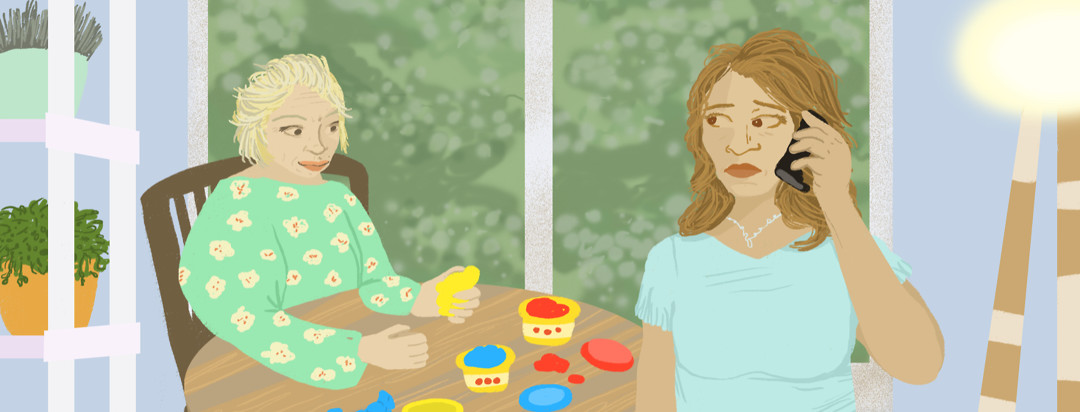Alzheimer’s Care Resources: Help and Support Through Progression
Asking for help is not an easy thing to do, especially as we get older. We are taught to learn to do things ourselves, figure it out, and shoulder the burden. Caregiving can be overwhelming, especially as the disease progresses, but there are Alzheimer's care resources out in your community right now.
It is not a one-person job, no matter how much you feel you can handle on your own. At some point, it will become a full-time responsibility.1
Communication is essential
An Alzheimer's diagnosis affects more than the person with the disease. It affects the whole family. As a person moves through the progressive stages of the disease, more care and patience will be required from the caregiver.2
As each family and caregiver have their own well-being, jobs, and responsibilities to look after, good communication becomes essential. Ensure the needs of the person with Alzheimer's are adequately met and caregivers have the support to meet those needs.
In the beginning
Upon adjusting to an Alzheimer's diagnosis, caring responsibilities may be manageable for the individual's primary support system. This period could last months or even years, as the disease affects each person differently. But the end of the path remains the same. Your loved one will gradually lose their ability to function independently.
As cognitive, physical, and functional abilities diminish, caregiver responsibilities increase. As much as you need a care plan for the person with Alzheimer's, you need one for yourself.
Grant yourself permission to take a break and ask for assistance. This involves figuring out where you can benefit from help. Whether allowing someone to do grocery shopping, house cleaning, or having friends and neighbors come over to socialize with your loved one, allow yourself to take time off. Use the time to rest, relax, and restore.2,3
Remaining healthy as a caregiver
Caregiver stress is a real thing. Full-time caregivers can experience depression, insomnia, and a myriad of health issues due to time limitations straining their time and attention.4 This often leads to caregiver burnout. The sustained stress may weaken your immune system leaving you at risk of getting sick.
Be realistic about what you can do. Recognize that the change in your relationship with the person you are caring for can be confusing. You may both experience a range of emotions, from sadness to loss.
Alzheimer's care resources
Talk to your family about sharing some of the responsibilities. People who know and care about your loved one may be eager to assist, they may just not know how to broach the subject with you.
Suggest specific tasks and match requests to interests, availability, and ability. Have people visit for activities and sensory experiences like singing, reading, painting, or working in the garden. Provide supervised interaction with pets. Some friends may offer to bring over meals on a regular schedule or run your errands while they are running their own.
Respite care gives you a block of time as a caregiver to rest, travel, or attend to other things.
Adult day centers
These centers offer activities for older adults with a range of physical and cognitive abilities. For people with Alzheimer's, adult day programs offer an opportunity to be social and involved in supervised activities. Some facilities are open up to 10 hours a day, and even offer services on the weekends.5
Adult day centers for people with different types of dementia can offer a safe environment under the care of trained professionals. Research has shown that keeping the mind engaged helps to delay the speed of symptom progression.5 Art, music, dancing, and exercise are just a few of the typical program options in adult day centers. Some centers also take participants on voluntary field trips and outings.
Counseling on supportive care and nutrition education may also be available at adult day centers. You may be able to arrange for special services including haircuts, speech therapy, or physical and occupational therapy.
Community resources for support
Outside resources can offer practical support as well. Helplines, forums, and training for caregivers are consistently offered in a variety of settings. Reach out to your local house of worship, civic organization, or Alzheimer's chapter to find out how you can benefit.
Some other helpful Alzheimer's care resources and supports include:
- Alzheimer’s Association can provide educational information, referrals to local resources.
- Community resources can be identified by searching with a tool that is a joint effort between the Alzheimer's association and AARP.
- Alzheimer's Foundation of America offers information and lists of services for people with Alzheimer's and their caregivers.
- National Adult Day Services Association helps identify adult day centers.
- The Family Care Navigator offers caregiver educational resources and links to state by state resources.
To create a personalized action plan, find outlines at the Alzheimer's Navigator.
Interested in more on progression and support through Alzheimer's? Check out Alzheimer's Progression: Support Through the Stages.

Join the conversation